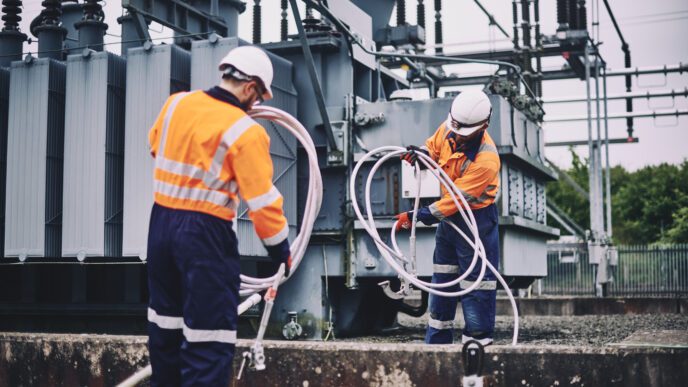As energy prices fluctuate and home solar adoption grows, more UK homeowners are looking at home battery storage to cut bills, reduce reliance on the grid, and store green energy.
Tesla’s Powerwall is one of the most well-known battery storage solutions—but is it the best option? How does it compare to other battery systems available in the UK? And is it worth the investment for your home?
What is the Tesla Powerwall?
The Tesla Powerwall is a home battery system that stores electricity either from:
Solar panels – Capturing excess solar energy during the day to use at night.
Off-peak grid energy – Charging up when electricity is cheapest and discharging when prices rise.
Once installed, it works automatically—detecting when to store energy, when to discharge, and even acting as a backup power source during outages. The system integrates with Tesla’s app, allowing homeowners to track energy usage in real-time.
Tesla’s Powerwall is one of the most advanced home batteries on the market, but how does it compare in cost, warranty, and value to other UK battery storage options?


Tesla Powerwall vs. Other Home Batteries in the UK
Cost Comparison: Tesla Powerwall vs. Non-Branded Installations
Battery System Battery Cost Installation Cost Total Estimated Cost
| Battery System | Battery Cost | Installation Cost | Total Estimated Cost |
| Tesla Powerwall 2 | ~£7,500 | £1,500 – £2,500 | £9,000 – £10,000 |
| Generic Home Battery | £3,500 – £6,000 | £1,000 – £2,000 | £5,000 – £8,000 |
| Battery with Solar Inverter | £5,000 – £7,000 | £1,500 – £3,000 | £6,500 – £10,000 |
Tesla’s Powerwall is on the premium end—but you’re paying for the built-in inverter, sleek design, and smart software integration. Other battery brands can be cheaper, but some may require additional inverters, more complex installations, or lack the seamless app experience.
Warranty & Lifespan: Tesla vs. Other Battery Options
| Battery System | Warrenty | Expected Lifespan |
| Tesla Powerwall 2 | 10 Year | 15+ years |
| GivEnergy 9.5kWh Battery | 10 Year | 12-15 years |
| SonnenBatterie | 10 Year | 15+ years |
| Solax Triple Power | 10 Year | 10-15 years |
Tesla offers one of the strongest battery warranties, guaranteeing 70% capacity retention after 10 years. However, many non-branded batteries now offer similar 10-year warranties—so the gap is closing.
Usability & Smart Features: What Sets Powerwall Apart?
Tesla Powerwall Advantages:
Built-in inverter – Some batteries require an additional inverter, adding cost.
Seamless smart grid integration – Tesla’s app optimises energy storage and usage.
Automatic storm detection & blackout protection – Can switch to backup mode instantly.
Time-based control for charging and discharging – Ideal for smart tariffs like Octopus Go.
Alternative Battery Advantages:
More flexibility on installation – Can work with a range of inverters & solar brands.
Lower upfront costs – Many UK batteries cost £2,000 – £4,000 less than Tesla’s Powerwall.
Modular systems available – Some brands (like Pylontech) allow for expandable battery packs rather than a one-size-fits-all approach.
Tesla’s plug-and-play design, reliability, and integration make it one of the easiest battery systems to set and forget. However, alternative brands can be more customisable and cost-effective, particularly for non-Tesla solar setups.
Is the Tesla Powerwall Worth It?
The Powerwall is worth considering if:
✅ You already have (or plan to install) solar panels and want a premium, reliable battery.
✅ You value a high-tech, user-friendly experience with a smart app and full automation.
✅ You live in an area with frequent power outages and need blackout protection.
✅ You’re on a smart tariff like Octopus Go, and want automated charging at off-peak times.
💰 However, if you’re looking for the lowest-cost battery system, alternative brands like GivEnergy, Solax, or Pylontech might be better value—offering similar storage capacity at a lower upfront price.
Final Thoughts: Powerwall vs. The Competition
Tesla’s Powerwall is a leading home battery storage solution, but it’s not the only option for UK homeowners. Alternative batteries can offer similar savings and performance at a lower upfront cost, particularly if you’re not already in the Tesla ecosystem.
If you’re considering battery storage, the best choice depends on your budget, energy needs, and whether you prioritise smart features over cost savings.
Want More Advice on Home Energy Storage?
🔗 Explore FutureChange’s guide to home battery systems
🔗 Learn more about Tesla’s Powerwall














